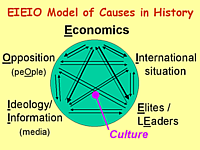UCSB Hist 133C,
L 21:
Building a Mass Movement
by Prof. H. Marcuse, 2/25/04
Again: What brought the wall down?
- Announcements & web option handout (link)
- Q8
- EIEIO and the end of East Germany
Announcements
- 4pts each extra credit: write a paragraph--What was Krell's/one panelist's
main point?
- Thursday, 5pm, downtown (524 Chapala):
Robert Krell: "Life Journeys of Child Holocaust Survivors"
- Friday, 2-4pm, 6020 HSSB: panel discussion "Survivors of Trauma"
- Web option handout: questions?
timeline: due this Friday AND next Friday
- Question: How many would prefer sources on-line? Please think about access…
Answer: of 30 students
attending, 22 said they would not have had trouble accessing an on-line reader
at 8am this morning before class; for 2 this would have been a hardship.
17 students said they would have printed out the sources anyway.
Only 6 students said they prefered an on-line only reader.
So I guess I'll continue to make a hard-copy reader available, but note that
the on-line version has links to many auxiliary sources and images (link
to reader toc).
Q8
- In "The Troubled Emergence of an Idea,"
- What institution in the East helped the two dissidents to express their
desire for change?
- What tool in the West were eastern dissidents at first reluctant to
use, but then embrace with great effectiveness?
- ONLY IF you draw a blank on those:
Activities in what two cities do Wagner & Eigenfeld tell about?
 EIEIO
Model of Causes in History
EIEIO
Model of Causes in History
Plug for Textbook!
300: "the GDR no longer conceived of itself as being in a brief transitional
phase in which undesired elements simply represented hangovers from the past.
Rather, 'actually existing socialism' would last a long time, and contained
its own intrinsic contradictions and difficulties, which head to be recognized,
analyzed, and dealt with, rather than dismissed as the debris of past history
which would eventually wither away."
308: "Rather than representing a precondition for the development of domestic
stability, the new explorations of national identity were rather predicated
on the prior transformation and stabilization of the two Germanies, which could
now afford, from a distance, to reflect more freely on their past."
Role of Churches
314: "German Lutheranism has frequently been declared a major culprit in preparing
the path to Hitler, with fingers pointed at the doctrine of obedience to secular
authority."
Nazi churches were complicit in genocide.
East Germany: organizational role.
Precursors to Change
- 1971: Ulbricht resigns as SED General Secretary
- Replaced by Erich Honecker,
gradual reform course:
- Ostpolitik and détente
- 1978: "constructive cooperation" with churches
- 1984: 1.3 mio East visit West
- 1987: 5 mio
- increasing reliance on loans
- 1983: Reagan's SDI
- 1985 Gorbachev Gen. Secretary of CPSU
- 1987, June: 12th Reagan's visit ; 6-8th: David Bowie, Genesis concert at
wall
- 1987, Sept.: Honecker visits West Germany, gets criticism and economic aid
from Kohl
- 1988, June: Intermediate Nuclear Forces treaty
page by H. Marcuse, prepared for web March 1, 2004
back to top, to UCSB Hist 133c homepage,
next lecture
 EIEIO
Model of Causes in History
EIEIO
Model of Causes in History EIEIO
Model of Causes in History
EIEIO
Model of Causes in History